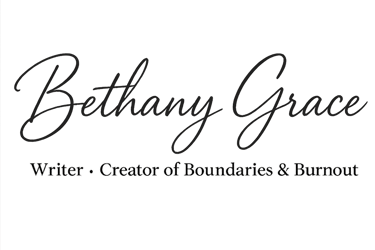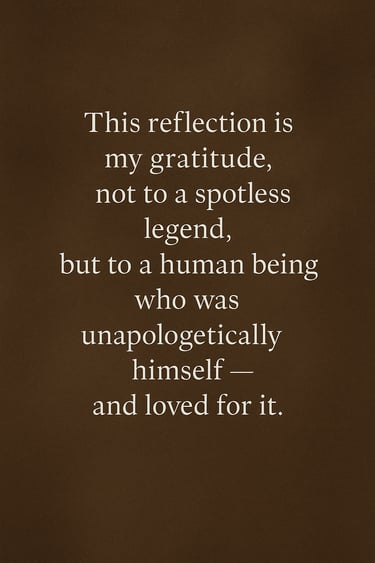The Empty Stage: Reflections on Legacy, Loss, and the Families We Come From
Their grief reminded me of something many of us know well: that legacy is rarely simple, and the families we come from shape us long after the story ends.
LEGACYGRIEFFAMILY HISTORYSTORIES TOLD THROUGH ART & PERFORMANCE
Bethany Grace
11/14/20257 min read


There are moments when the world witnesses a family; I personally didn't know, grieving publicly, and yet what we see is only the surface —
the spoken parts, the outward expressions, the fragments of emotion that make it to a camera or microphone.
What we don’t see is the undercurrent, the private weight, the tremble beneath the words.
Listening to the Osbourne family speak about losing Ozzy felt like one of those moments for me —
not because I know their inner world, but because something in their public grief stirred something familiar in my own.
It reminded me that some legacies — especially the ones shaped by both love and struggle — leave deep emotional impressions.
From the outside, Ozzy’s life appeared anything but simple. Like many public figures, his story unfolded in full view —
highs, lows, struggles, growth, and all the moments in between. And when someone who lived so openly is gone, the emotions surrounding that loss can feel layered.
Grief often becomes the final conversation we have with the people who shaped us —
and for many families, mine included, that conversation can be jagged and complex. Hearing the Osbournes speak simply reminded me of that truth.
Legacy Isn’t Measured by Perfection — It’s Measured by Presence
People often imagine legacy as a clean story — a list of achievements, triumphs, and well-edited memories.
But real legacy doesn’t work like that.
Real legacy is the imprint someone leaves on the people who knew them intimately —
in all the messy, painful, loving, complicated ways that make a human life real. It’s shaped by presence, not polish.
From what was shared publicly over the years, Ozzy never hid the harder chapters of his life.
Many people related to him because he was open about his struggles as well as his strengths.
And in many families shaped by complicated histories — including my own — presence can feel like both comfort and contradiction.
Someone can matter profoundly even when the relationship was not simple.
That is legacy — the complicated truth of being human in front of the people who love you in their own ways.
Families Don’t Heal in Straight Lines
From the outside, the Osbournes never seemed to hide the ups and downs of family life. Their openness over the years often highlighted both love and challenge — something many families can relate to.
Families shaped by trauma, addiction, or instability often develop their own rhythm of healing:
apologies that surface years too late
moments of tenderness that arrive without warning
cycles that repeat until someone decides they won’t
love that feels like both safety and risk
memories that comfort and wound in the same breath
Healing in these families isn’t linear — it’s cyclical. You don’t “fix” everything and move on.
You revisit, reprocess, unravel, and rebuild.
Listening to their reflections made me think about how, in many families, losing someone with a long,
layered history brings up every part of that story at once — the tender moments and the painful ones.
That kind of grief isn’t just emotional.
It’s ancestral.
It’s generational.
And it can take a lifetime to understand.
When Grief Speaks Through Anger
When I heard Kelly speak about her father’s burial site being visible online, there was a depth to her emotion that resonated with me. It reminded me how grief can erupt as anger — not because someone didn’t matter, but because they mattered so profoundly that the loss shakes something loose inside you.
Anger is one of grief’s clearest dialects.
It erupts when:
love has nowhere else to go
protection becomes impossible
privacy is violated
boundaries fail
the weight of loss becomes too heavy to hold quietly
Anger in grief often means:
“You mattered so much that losing you destabilized something in me.”
For many of us who grew up loving complicated people, that anger becomes even more tangled. Because we grieve the whole of someone.
the tenderness and the harm
the conversations we had and the ones we never got
the comfort and the chaos
the love they gave
and the love we still needed
Hearing their emotions made me think about how many families grieve not an idealized version of someone, but the whole of who they were.
And grief like that doesn’t resolve —
it evolves.
Love Can Be Loud, Messy, and Imperfect — and Still Be Love
Over the years, from what the public has seen, their family seemed to love in a way that felt big and unfiltered — something many people from chaotic or tender-upbringing homes understand deeply.
There is a particular kind of love that comes from surviving chaos together — a love that is raw, unfiltered, and rooted in a deep, often painful understanding.
This is a truth many adults raised in difficult homes eventually learn:
Love doesn’t have to be gentle to be genuine.
And pain doesn’t cancel out connection.
You can grieve someone who hurt you.
You can love someone who didn’t always know how to love you back.
You can wish for more while honoring what was.
This isn’t contradiction —
it’s the complexity of being human.
The Parts We Try to Hide Become the Parts We’re Remembered For
The world often imagines legacy as accomplishments, awards, or public triumphs.
But the truest parts of legacy come from vulnerability.
People don’t remember our highlight reels.
They remember the moments we were painfully, beautifully human.
Ozzy spent much of his life in the public eye, and many people connected to his honesty about the challenges he faced.
That openness created a sense of permission for others to embrace their own imperfect stories.
And maybe that’s the quiet lesson inside all of this:
The parts of ourselves we fear the most often become the parts that teach others how to be human.
Why This Matters to Me
Listening to the Osbourne family speak about their loss felt familiar in a way that caught me off guard.
Not because my story mirrors theirs, but because grief inside a complicated family often echoes in recognizable patterns — regardless of whose name is attached to it.
I understand what it’s like to lose someone who wasn’t easy to love, but was still mine.
I understand layered grief — the pain, the relief, the gratitude, the guilt, the anger, the softness, the confusion.
I understand mourning a person while also mourning the version of them I never received.
And I understand how a family’s history can echo long after the person is gone.
Writing about Ozzy’s legacy isn’t about the celebrity of it — it’s about the humanity of it.
It’s about recognizing the patterns many of us grew up with, acknowledging the parts of our parents that shaped us, and learning how to carry the truth without letting it drown us.
This matters to me because I’m learning what legacy means in my own life — what I inherited, what shaped me, and what I hope to pass forward with more clarity and gentleness.
In the end, reflections like this remind me that every human life — especially the complicated ones — leaves behind an emotional blueprint in the people who survive it.
A blueprint of:
love and harm
chaos and connection
wounds and resilience
questions and memories
grief and gratitude
Most of us won’t leave behind a public legacy.
But we will leave behind something equally powerful:
the emotional inheritance our children and families carry forward.
Hearing their grief reminded me that every family carries the emotional blueprint of the people who came before them.
I’m learning how to carry mine, just as countless others are learning how to carry theirs.
The truth is this:
You don’t have to be perfect to leave a legacy.
You just have to be human enough to be remembered.





Thank you, Ozzy —
for the music,
for the honesty,
for the raw, unfiltered humanity you shared with the world.
You never hid the harder parts of your story, and because of that, millions of people felt seen in their own struggles.
Your voice held people through chaos and comfort, rebellion and reflection, pain and healing.
Myself included.
And to the Osbourne family —
thank you for sharing him with all of us.
Thank you for allowing the world to witness pieces of your journey, your love, your laughter, and your pain over the years.
Thank you for the moments of openness that made so many of us feel like we weren’t alone in our own complicated family stories.
Thank you for carrying his legacy with such honesty and heart.
This reflection — and the journal that grew from it — are not about defining your grief or speaking for your experience.
They are simply the echoes of what your family’s openness stirred in my own healing journey.
So thank you —
for the music,
for the humanity,
for the vulnerability,
and for the gift of a life that meant something to so many.
See you on the other side.
A gentle pause before you go
Take a slow breath.
Let the music settle.
Let the words soften something inside you — even if just for a moment.
These questions aren’t meant to be answered perfectly.
They’re simply invitations to notice what’s stirring in you after reading, listening, and remembering the people who shaped your story.
1. What emotion rose up in you while reading this — and what might it be trying to show you?
2. When you think about your own family lineage, what memories or patterns echo the loudest?
3. Is there someone in your life whose legacy feels complicated — someone you grieve in more than one direction?
4. What part of your emotional inheritance are you learning to carry differently than it was handed to you?
5. If you could whisper one truth to the person you’re thinking of right now — whether they can hear it or not — what would you say?
As you step away from this space, let whatever surfaced rest gently with you.
Nothing needs to be resolved today.
Grief, legacy, and family truths aren’t puzzles to solve — they’re stories we learn to hold with tenderness, one layer at a time.
Carry only what feels light enough for now.
Leave the rest here to return to when you’re ready.
And if these reflections opened something in you, the companion journal offers a deeper, softer place to keep exploring — at your own pace, in your own time.


